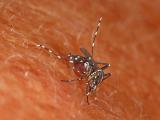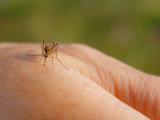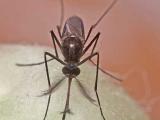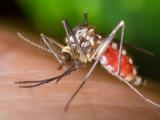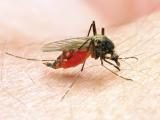Aug 19, 2003 (CIDRAP News) – As the number of West Nile virus cases continues to climb, the National Institute of Allergy and Infectious Diseases (NIAID) announced that its scientists have created a promising new vaccine against the virus. The vaccine involves a distantly related virus, dengue type 4, in which some proteins have been replaced by corresponding proteins from the West Nile virus.
The chimeric, or hybrid, virus has been shown to be effective in rhesus monkeys, according to a report to be published in the September issue of Virology and now available online.
In an NIAID news release, Dr. Brian Murphy, MD, of the NIAID Laboratory of Infectious Diseases, said scientists are optimistic that the hybrid vaccine will provide long-term immunity to West Nile. Clinical trials of the vaccine are expected to begin later this year, the NIAID said.
"West Nile is one of the emerging infectious diseases for which we are developing novel preventive and therapeutic tactics," said NIAID Director Anthony S. Fauci, MD, in the press release. "Because our researchers have more than a decade of experience working with this class of virus, they could respond very quickly to the urgent public health need for a promising West Nile virus vaccine."
The vaccine uses a live but weakened virus. The technique to combine two viruses for one vaccine was developed in 1991 at the NIAID by Dr. Alexander Pletnev and colleagues, according to the news release. The technique can render viruses unable to cause disease but leave them strong enough to trigger an immune response, the agency said.
For the West Nile vaccine, scientists further weakened the West Nile/Dengue 4 virus by deleting some of the dengue 4 virus's RNA. Researchers tested versions of the virus with the full and partial complements of dengue RNA and found that removing the RNA further weakened the virus, making it safer for humans.
The NIAID said one or the other of the chimeric virus vaccines was given to 12 monkeys, and an additional 8 monkeys were injected with either the West Nile virus or dengue 4 virus for comparison. After six weeks, all 20 monkeys were injected with West Nile virus. The 12 monkeys that had received the chimeric virus developed high levels of neutralizing antibodies that successfully fought the West Nile virus.
The clinical trials of the vaccine will be conducted at Johns Hopkins University in Baltimore, NIAID spokeswoman Linda Joy told CIDRAP News today. If it is found to be safe and effective, the vaccine will be recommended for people most susceptible to serious West Nile virus illness and those whose activities put them at increased risk of exposure to the disease, Joy said.
So far this year, 599 people have contracted West Nile virus infection and 11 have died, according to the Centers for Disease Control and Prevention. The peak season for West Nile virus transmission is from late August to early September. Most people infected with the virus will not show any symptoms, another 20% will have mild illness, and approximately 1% suffer severe illness or death. The elderly and immunocompromised are most susceptible to the disease.
Pletnev AG, St. Claire M, Elkins R, et al. Molecularly engineered live-attenuated chimeric West Nile/dengue virus vaccines protect rhesus monkeys from West Nile virus. Virology 2003 (early online publication) [Abstract]
See also:
NIAID news release
http://www.nih.gov/news/pr/aug2003/niaid-18.htm
West Nile virus case count
http://www.cdc.gov/ncidod/dvbid/westnile/surv&controlCaseCount03.htm

